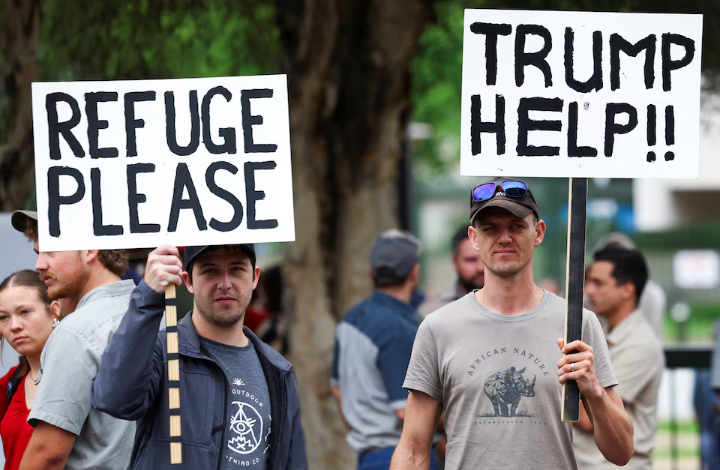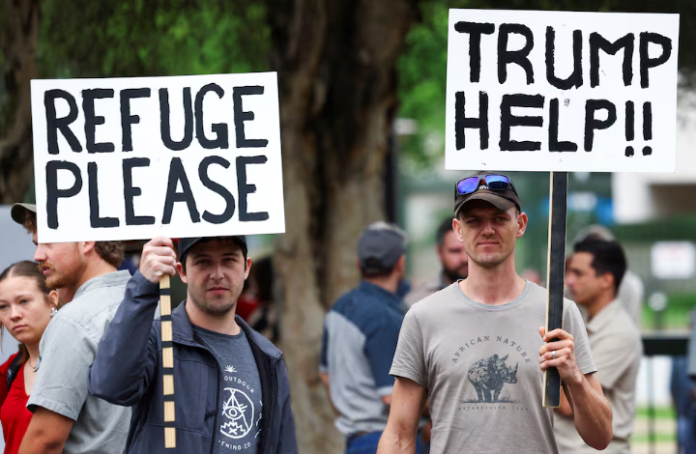In a controversial move, U.S. officials have started conducting interviews with white South Africans seeking refuge in the United States. These individuals claim they are fleeing persecution linked to land disputes, crime, and racial tensions in their home country. While refugees from other nations are being deported or blocked from entering the U.S., South African applicants have received a somewhat warmer welcome, with several already gaining preliminary approval for resettlement.
The U.S. Embassy in Pretoria recently facilitated interviews where applicants shared their personal accounts of hardship, including violent attacks and discrimination. One applicant, Mark, a South African farmer, praised the embassy staff for their empathy and the respectful handling of his case. “The staff at the embassy were exceptionally friendly,” he shared. “I could feel they had empathy for what we had been through.”
The interviews follow a February executive order by former U.S. President Donald Trump, which aimed to resettle Afrikaners, descendants of Dutch settlers in South Africa, claiming that they have been victims of “unjust racial discrimination.” This executive order has garnered support from some white South Africans who feel marginalized due to policies such as Black empowerment laws and land expropriation measures. Trump’s order came shortly after the U.S. suspended its refugee admissions program over concerns about security and costs.
While some applicants are excited about the opportunity to start anew in America, others fear that the U.S. may not fully appreciate the context of South Africa’s complex history of apartheid and colonialism. Critics argue that Trump’s focus on white South Africans overlooks the broader struggles of the country’s Black majority, many of whom continue to face severe economic and social challenges. In fact, South African government officials have pointed out the irony of offering refuge to members of the nation’s most economically privileged group, noting that Afrikaners constitute around 60% of the country’s white minority, who control a disproportionate amount of wealth and land.
Despite these criticisms, the U.S. appears to be moving ahead with the process. According to reports, U.S. refugee officers have been traveling to Pretoria to meet applicants, some of whom have provided testimony about the risks they face on their farms or in their communities. These applicants, including farmers who’ve suffered violent attacks, have shared that they were treated with sensitivity and understanding during their interviews. Mark, for instance, explained that Black empowerment laws had made him unemployable, and that he and his family were victims of a brutal farm attack in 2023.
On the other hand, many South Africans, particularly from the Black community, have criticized the notion of white victimhood in the context of the U.S. resettlement program. According to experts, crimes against white South Africans are often framed by some as racial genocide, which downplays the broader issue of violence in the country. Crime statistics show that far more Black South Africans fall victim to violent crimes, yet the narrative that white South Africans are uniquely targeted remains prevalent among far-right circles and some media outlets.

The ongoing debate over the resettlement of white South Africans in the U.S. has sparked mixed reactions. While some see it as a necessary intervention to protect people facing persecution, others view it as a misinterpretation of South Africa’s complex socio-political landscape. South African critics point out that the country’s painful history of apartheid and colonialism is not fully acknowledged in the discourse surrounding these claims.
The number of white South Africans seeking to resettle in the U.S. is growing, with over 67,000 people expressing interest, according to the South African Chamber of Commerce in the U.S. However, it remains unclear whether the U.S. will expand the resettlement program beyond Afrikaners or consider other individuals from South Africa’s white minority.
While the application process continues, the political and social implications of this resettlement initiative remain hotly debated. For some, it represents an opportunity for a fresh start, while for others, it raises difficult questions about race, privilege, and historical context in post-apartheid South Africa.



